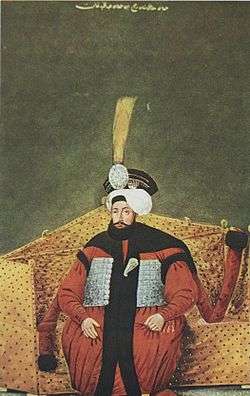Mustafa IV
| Mustafa IV مصطفى رابع | |||||
|---|---|---|---|---|---|
|
Caliph of Islam Amir al-Mu'minin Sultan of the Ottoman Empire Custodian of the Two Holy Mosques | |||||
 | |||||
| 29th Ottoman Sultan (Emperor) | |||||
| Reign | 29 May 1807 – 28 July 1808 | ||||
| Predecessor | Selim III | ||||
| Successor | Mahmud II | ||||
| Born | 8 September 1779 | ||||
| Died | 16 November 1808 (aged 29) | ||||
| Consorts |
Şevkinur Kadın Dilpezir Kadın Seyyare Kadın Peykidil Kadın | ||||
| Issue |
Şehzade Abdullah Emine Sultan | ||||
| |||||
| Dynasty | House of Osman | ||||
| Father | Abdul Hamid I | ||||
| Mother | Ayşe Seniyeperver Sultan | ||||
| Religion | Sunni Islam | ||||
| Tughra |
| ||||

Mustafa IV (Ottoman Turkish: مصطفى رابع Muṣṭafā-yi rābi‘; 8 September 1779 – 16 November 1808) was the Sultan of the Ottoman Empire from 1807 to 1808.
Biography
Born in Constantinople, Mustafa IV was the child of Sultan Abdülhamid I (1774–1789) and Ayşe Seniyeperver Sultan .[1]
Both he and his brother, Mahmud II, were the last remaining male members of the house of Osman I after their cousin, the reformist Sultan Selim III (1789–1807). They alone were therefore eligible to inherit the throne from Selim, by whom they were treated favorably. Since Mustafa was the elder, he took precedence over his brother to the throne.[2] During his short reign, Mustafa would both save his cousin's life, and order him murdered. Mustafa was Sultan Selim III's favourite crown prince, but he deceived his cousin and co-operated with the rebels to take his throne.
Mustafa came to the throne in the wake of the turbulent events that led to the fatwa against Selim for "introduce[ing] among the Moslems the manners of infidels and show[ing] an intention to suppress the Janissaries."[3] Selim fled to the palace, where he swore fealty to his cousin as the new sultan, and attempted to commit suicide. Mustafa spared his life by smashing the cup of poison that his cousin attempted to drink.[3]
Mustafa's brief reign was turbulent. Immediately upon ascending to the throne, the Janissaries rioted throughout Constantinople, looting and murdering anyone who appeared to support Selim.[4] More threatening, however, was a truce signed with the Russians, which freed Mustafa Bayrakdar, a pro-reformist commander stationed on the Danube to march his army back to Constantinople in an effort to restore Selim. With the aid of the Grand Vizier of Adrianople, the army marched on the capital and seized the palace.[3]
Attempting to secure his position by positing himself as the only surviving heir of Osman, Mustafa ordered both Selim and his brother Mahmud murdered at Topkapı Palace, Constantinople. He then ordered his guards to show the rebels Selim's body,[4] and they promptly tossed it into the inner courtyard of the palace. Mustafa then ascended his throne, assuming that Mahmud was also dead, but the prince had been hiding in the furnace of a bath.[5] Just as the rebels demanded that Mustafa "yield his place to a worthier," Mahmud revealed himself, and Mustafa was deposed. The failure of his short reign prevented the efforts to undo the reforms, which continued under Mahmud. Mustafa was later killed on Mahmud's orders.
Personal life
His mother was Ayşe Seniyeperver Sultan. His wives were: Şevrinur Kadın, Dilpezir Kadın, Seyyare Kadın and Peykidil Kadın. He had a girl named Emine Sultan who died in 1808 when six months old.
References
- ↑ Yavuz Bahadıroğlu, Resimli Osmanlı Tarihi, Nesil Yayınları (Ottoman History with Illustrations, Nesil Publications), 15th Ed., 2009, page 395, ISBN 978-975-269-299-2
- ↑ Lord Kinross, The Ottoman Centuries: The Rise and Fall of the Turkish Empire, Perennial, 1977, p. 437. ISBN 0-688-03093-9.
- 1 2 3 Kinross, p. 433.
- 1 2 Goodwin, p. 291.
- ↑ Kinross, p. 434.
External links
![]() Media related to Mustafa IV at Wikimedia Commons
Media related to Mustafa IV at Wikimedia Commons
| Mustafa IV Born: 8 September 1779 Died: 15 November 1808 | ||
| Regnal titles | ||
|---|---|---|
| Preceded by Selim III |
Sultan of the Ottoman Empire 29 May 1807 – 15 November 1808 |
Succeeded by Mahmud II |
| Sunni Islam titles | ||
| Preceded by Selim III |
Caliph of Islam 29 May 1807 – 15 November 1808 |
Succeeded by Mahmud II |